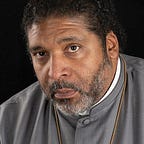Ecological Justice Is A Moral Issue
There are communities in this country that are being contaminated. Toxic waste from multinational corporations and energy companies is being dumped into wells and rivers with no regard for the environment or the people who live nearby. All of this pollution gets into drinking water and the air and creates numerous health problems for these communities.
Last week we held a two-day “Ecological Justice Organizing Tour,” in North Carolina where we heard from former Vice President Al Gore; his daughter, Karenna Gore, director of The Center for Earth Ethics at Union Theological Seminary; along with impacted residents of these toxic waste dumps. Residents who live near the Duke Energy’s coal-fired steam station described waking up in the morning years ago to find their cars covered in coal dust. After being stored in coal ash ponds, the heavy metals from that coal is now in the well water that they drink, leading to multiple health problems. A Northampton County resident said that they attended the tour because their community was “killing them.”
People all around the country have been victims of toxic waste dumping. From Eden, North Carolina, where wells have been contaminated by coal ash courtesy of Duke Energy; to towns along the Cape Fear River, which has been contaminated by GenX chemical spills from the Chemours Chemical Company; to the indigenous tribes that have land along the Atlantic Coast Pipeline route. People who live near open pits of industrial hog waste and factory feedlots also often experience health problems due to the harmful toxins and odors they are forced to live with.
It should come as no surprise that the people who are most affected by these toxic sites are those who are living in poverty. The 140 million Americans living in poverty are the ones who are most at risk of environmental health issues and are the least likely to be benefitting from the profits of the corporations at fault. In fact, it is impossible to even begin to consider solutions to this devastating problem without first addressing issues of systemic poverty and systemic racism that are keeping people sick, without access to health care, and without the opportunity to obtain safe and healthy food and homes.
If we want to find true solutions to the issues at hand, it is important to talk with those who have lived through it. These are the voices needed to fix the laws, public policies, and systems that are currently destroying people’s lives and the environment. Impacted resident Bobby Jones said, “I’ve knocked on too many doors where people have lost loved ones… and then you see this giant company that’s completely in denial about its role.”
It is impossible for our elected leaders to claim that they care about us when they are allowing corporations to destroy the very environment we inhabit. These immoral politicians don’t care about where a multi-billion dollar corporation dumps its waste if the money is lining their pockets. We have too many lawmakers that would rather benefit from the death and destruction caused by pollution than to invest in the renewable energy that would be good for the environment and save lives. And Republican governors are further perpetuating the problem by refusing to expand Medicaid or raise the minimum wage. In North Carolina alone, there are 1 million uninsured people, and half of them could receive coverage with Medicaid expansion. These policies, or lack thereof, are keeping people sick and poor. But we shouldn’t be surprised, because the same politicians who refuse to expand Medicaid also refuse to renew the Voting Rights Act. They’re the same ones who refuse to implement living wages and oppose immigrant rights.
Environmental justice is not a left or right issue. It is not a black or white issue. It is a moral issue. Although pollution does not discriminate based on race, we do know the sources of pollution benefit the wealthy while harming the poor. How long do you think our government would let a corporation dump coal ash into the drinking water of a wealthy suburb? Because the victims of pollution are poor people, they are ignored in favor of the monetary gain that these corporations provide.
There should be no argument against preserving our planet and making sure that these companies are disposing of their waste in a way that’s not harmful to the environment and not harmful to the communities in which they reside. There should be no opposition to funding clean energy initiatives with the aim of replacing harmful fossil fuels.The Poor People’s Campaign: A National Call for Moral Revival is calling upon all Americans to rise up and say that they are sick and tired of this nation’s lawmakers putting profits before people. The Poor People’s Campaign is being led by Repairers of the Breach in partnership with national and local partners. Our lives depend on real solutions being implemented now and that starts with addressing not only the pollution, but the wealth gap, and the lack of health care.
To find out more about the Poor People’s Campaign: A National Call for Moral Revival, visit www.poorpeoplescampaign.org.
